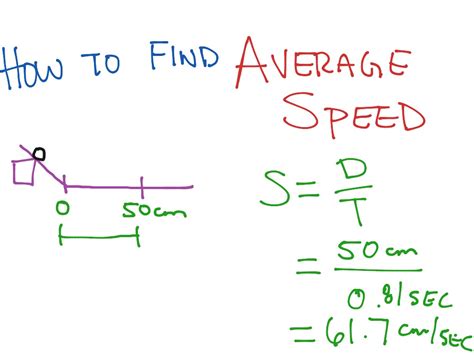How to Calculate Average Speed: A Simple Guide
Calculating average speed is a fundamental concept in physics and everyday life. Whether you're planning a road trip, analyzing athletic performance, or solving a physics problem, understanding how to calculate average speed is essential. This guide will walk you through the process, providing clear explanations and examples.
Understanding Average Speed
Average speed isn't about your speed at any single moment; it's about the overall speed maintained over a specific distance and time. It's the total distance covered divided by the total time taken. Crucially, it doesn't account for changes in speed along the way – only the beginning and end points matter.
Think of it this way: You might drive at 60 mph for part of your journey and 30 mph for another part. Your average speed will be a number somewhere between these two speeds, representing your overall progress.
The Formula for Average Speed
The formula for calculating average speed is remarkably simple:
Average Speed = Total Distance / Total Time
Units of Measurement
It's important to be consistent with your units. If you measure distance in miles, time should be in hours; if distance is in kilometers, time should be in hours. Common units for average speed include:
- Miles per hour (mph)
- Kilometers per hour (km/h)
- Meters per second (m/s)
Examples: How to Calculate Average Speed
Let's illustrate with some practical examples:
Example 1: A Simple Road Trip
You drive 240 miles in 4 hours. What's your average speed?
- Total Distance: 240 miles
- Total Time: 4 hours
Average Speed = 240 miles / 4 hours = 60 mph
Example 2: A More Complex Journey
You travel 100 km to a town, taking 2 hours. The return journey takes 2.5 hours. What's your average speed for the entire trip?
- Total Distance: 100 km + 100 km = 200 km
- Total Time: 2 hours + 2.5 hours = 4.5 hours
Average Speed = 200 km / 4.5 hours = 44.44 km/h (approximately)
Example 3: Working with Meters and Seconds
A runner covers 1000 meters in 100 seconds. What's their average speed?
- Total Distance: 1000 meters
- Total Time: 100 seconds
Average Speed = 1000 meters / 100 seconds = 10 m/s
Troubleshooting and Common Mistakes
- Inconsistent Units: Make sure your distance and time units match.
- Forgetting Total Distance/Time: Always calculate the total distance and total time for the entire journey, not just individual segments.
- Miscalculating Time: Ensure you convert time to a single unit (e.g., minutes to hours).
Beyond the Basics: Average Speed vs. Average Velocity
While this guide focuses on average speed, it's worth noting the distinction between average speed and average velocity. Average velocity considers both speed and direction, making it a vector quantity. Average speed, however, only considers the magnitude of the speed, making it a scalar quantity. For most everyday calculations, average speed is sufficient.
By following these steps and understanding the formula, you'll be able to confidently calculate average speed in various scenarios. Remember to always pay attention to your units and double-check your calculations!
